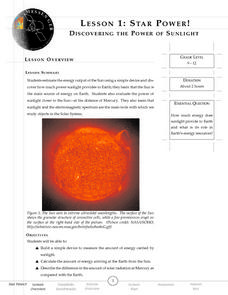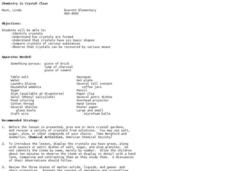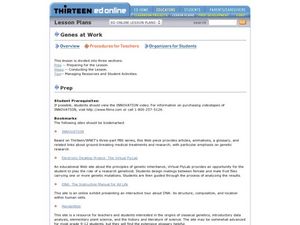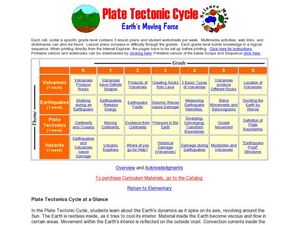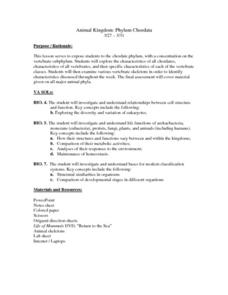Curated OER
Introduction to Adult Insects and Their Adaptations
Learners study organisms found in Class Insecta. They examine the different adaptations these organisms have developed over time to survive and prosper in their respective habitats. They research the origin of the names of several orders...
Curated OER
What is all the Fuss about?
Students brainstorm a list of science discoveries and inventions that they think are important. They work in small groups, students examine 1-3 science discoeries more closely. Each group needs a recorder, and they answer three...
Curated OER
Discovering The Power Of Sunlight
High schoolers participate in a instructional activity that looks at the potential for energy from sunlight. Students conduct research from a variety of resources and construct an object that is used to measure the energy of sunlight and...
Curated OER
DNA Models
Students create DNA models. Using puzzle pieces to represent the parts of a DNA strand, they put together a segment of DNA. Once everyone has completed their individual strand, they being linking with other students using tape. Class...
Curated OER
High School Bag Design
Students design a bag that they would personally use to carry needed items to school. In this bag design lesson, students observe real bags and assess needs and wants for a new bag. Students brainstorm design solutions and render their...
Curated OER
The Role of Enzymes
Learners explore the role of enzymes in chemical reactions. In this enzymes lesson plan, students use hydrogen peroxide and manganese dioxide to observe a chemical reaction. Learners observe the rates of reactions of chalk, hamburger,...
Curated OER
Chemistry is Crystal Clear
Students observe crystals and their shapes and formation. In this crystal formation lesson, the teacher prepares crystal gardens for the students to observe, then the class finds examples of crystals in nature and observe a teacher...
Curated OER
Genes at Work
Young scholars explore and discuss genetics stories and answer questions about genetic outcomes of offspring. In this genetics lesson, students read genetics stories on a web site. Young scholars use a chart to answer questions regarding...
Curated OER
What is a Seed?
First graders identify the parts of a seed. In this plant biology instructional activity, 1st graders are given a seed and identify each part of the seed by using a hand lens. Students plant a seed and graph the growth.
Curated OER
Bacteria and Illness
Students research information on bacterium and their relationship to food borne diseases. In this science lesson plan, students complete internet research to construct and analyze the growth cure of common bacterium...
Curated OER
Plate Tectonic Cycle
Students explore the Earth's movements by completing worksheets. In this plate tectonics activity, students define such natural disasters as volcanoes, earthquakes, tsunamis and mudslides and discuss their connections to plate tectonics....
Curated OER
Dietary Fiber
Students examine the different types of fiber and their benefits. For this investigative lesson students find good sources of fiber in different foods.
Curated OER
Can Photosynthesis Occur at Saturn?
Students identify the different requirements for photosynthesis to take place. In this space science lesson, students simulate conditions in Saturn to investigate if photosynthesis is possible there. They use data and observations...
Curated OER
Plants And Pollination
Students describe sexual reproduction in plants, including the process of pollination, how insects assist in pollination, and how pollination differs from fertilization. They also explore the importance of honey bees to Arizona agriculture.
Curated OER
Mixing Colors
Students understand why we see various colors. In this mixing colors lesson, students experiment with different food coloring to explore how colors are made. Students record on a data sheet the colors they see.
Pennsylvania Department of Education
Animal Classes and Their Ecosystems
Students explore animal characteristics by participating in an environment identification activity. In this animal habitat lesson, students discuss a range of different wild life and the ecosystems that they are a part of. Students view...
Curated OER
Animal Kingdom: Phylum Chordata
Students use a dichotomous key to classify various vertebrate jar speciments into classes. They examine the speciments for general characteristics of each class and fill in a corresponding chart and then complete a few final assessment...
Curated OER
Invertebrate Classification
Students discuss the recent disovery of the "furry lobster" to peak interest in the animal kingdom. They classify various speciments using invertebrate dichotomous keys, identifying major animal phyla and classes. Thy the complete the...
Curated OER
Kingdom Animalia ~ A Look at the Five Major Classes
Biological taxonomy masters examine the five main classes under phylum chordata. Pupils compare and contrast the identifying characteristics of the various organisms. They explain why taxonomy is important in classifying organisms. You...
Curated OER
Describe the Perfect Pathogen
Students develop a pathogen based upon their knowledge of pathogens and after presenting it to the class, they then suggest ways that the pathogen might be combated. Next they identify possible physical or behavioral changes in a...
Curated OER
DNA: What Does It Mean?
Tenth graders explore DNA using online tutorial. They perform their own DNA extraction from a clove of garlic and identify the key components of DNA.
Curated OER
The Honey Bee's Home
Students study honey bees by researching handouts and books. In this honey bee lesson plan, students make a comb out of polygons, learn about the 4 stages of insect development, and view how the hive hierarchy works.
Curated OER
Activities of the Immune System (Activity 1)
Students cut an apple in half and cover half with plastic wrap. They place drops of liquid on each half and discover how our skin protects us. They answer discussion questions to end the lesson.
Curated OER
Transcription, Translation, and the Genetics of Microbes
Students construct various virus models using Fruit loops and Alphabits to represent nucleotides and molecules. They constructs capsomeres using shoes as the capsomeres and discuss various viruses.
Other popular searches
- Plant Cell Biology
- Inquiry Based Cell Biology
- Cell Biology Mitosis
- Cell Structure Powerpoint
- Cell Biology Meiosis
- Cell Structure and Function
- Cell Biology Vocabulary
- Label Cell Parts
- Grade 11 Cell Biology
- Cell Parts Pictures
- Cell Biology Activities
- Human Cell Biology


